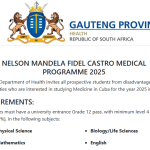Before you start your study abroad journey, it’s important to be informed about the processes involved. Studying abroad requires a whole lot of effort and has various processes. From choosing the right course to choosing the right study destination to choosing the best school option, to viewing the funding options available and the list goes on. The process also requires time. Depending on the information you have and your decision-making process, your study abroad dreams can take as long as a year or less than that. If you desire to study abroad in top countries, or anywhere in the world for that matter, then this article is a must-read. Everything you need to know about studying abroad is explained in this article to guide you through your journey. Find this article helpful? Subscribe to our newsletter for more related content.
Also read: Study VISA For Spain: Eligibility Criteria, Application Process In 2024
Table of Contents
Benefits of studying abroad
There are many benefits attached to studying abroad. If you’re still contemplating or you’re finding it difficult to make up your mind, here are some reasons that’ll help you:
- You stand the chance of school in a world-class university, hence gaining access to high-quality education. Choosing a study destination like the U.S., or UK allows you to study from the best as these study destinations host some of the best universities globally.
- It avails you the opportunity to learn a new culture and relate with people from other parts of the country. It can help you better shape your perspective of people and the world at large.
- Regarding employment, studying in a prominent school gives you an advantage as your skills will be relevant in your chosen industry.
- Additionally, it also allows you to explore a different part of the world.
Studying abroad is exciting, also you might first be uncertain with thoughts of what you expect before you begin the journey, however, the experience gives you a broader perspective of the divisiveness of the world. Consequently, for you to have the best experience, you must pick a study destination that suits your interests and your goals.
Choosing the right study destination
Before you start applying to school, you must first agree on a preferred study destination. This will help you streamline the options available for you out of the vast options and make the selection process easier. Generally, choosing the right study destination is not an easy task. There are so many factors to consider like your career and academic goal, your financial plan, the culture of the people, the tuition cost, the duration of the program, and the employment prospects after graduation. To make the right decision, clearly outline your academic and your career goals. Answer these questions to help you:
- What is my area of interest and my strenght?
What course do I want to study?
How would studying this course help my career after graduation? - What country/countries are best for studying my preferred course?
- How affordable is it?
- Do I plan on returning to my home country afterward?
Answering these questions will help you streamline the available options and make the selection process easier. However, you can also employ the help of a study abroad counselor to guide you.
Also read: Ask These Vital Questions Before STARTING Your Study Abroad Journey.
Starting the process
The process begins when you make up your mind. Afterward, take an extra step to select a course that aligns with your career goals and your destination. Afterward, it doesn’t end at just selecting a course and a school, you’ll have to apply to gain admission into the school.
Once you’re settled on your preferred course and destination (university), you’ll still have to research. on the school’s application process. The application process differs according to the individual school requirements. Oftentimes, you’ll find the information about the preferred course of your choice on your school’s website things like:
- The application dates (both the opening and closing)
- Required documents
- Course requirement (for Master’s and PhD students)
- Tuition fee
- Application fee
- Resumption date
- Other related fees.
All of these are to make the application process simpler. It is advisable to go through the school’s website to familiarize yourself with this information and gather the necessary documents before you start the application.
Also, the Advent of technology has made things easier for everyone, including international students. The application process for almost all schools is done online via the school’s website. All you need to do is to follow the instructions provided.
Also read: Discover Why A Study Abroad Counselor Is Essential
The application process
Once you have gone through the school’s website and you meet all the criteria, you can then begin your application. Typically, programs starting in the fall (September/October) will be open from the beginning of the year to the middle of the year (take note that this is solely dependent on the school’s schedule).
As stated earlier, the application process especially for students can take months, so it is advisable to start your application early enough to get a slot as at when due. To start your application into your preferred school you’ll see a “start application or an apply” button on the school’s website. Your personal information is most likely going to be the first thing you will be required to provide.
Afterward, you’ll be asked about your education history for the school to know if you’re the best fit for the course. It doesn’t end there you’ll also be asked to provide some required documents that cannot be waived. Depending on the school, you might be asked to take a standardized test or a language test. Additionally, if a fee is required you must pay the fee before you proceed with the application. In some cases, you might be interviewed by the admission board of your proposed school. Once you’re done filling out the form and providing the stated document, you can submit your application and wait for a response (via email) from the school.
The required documents
Additionally, students are always required to upload some documents during the application process. These documents differ according to the individual school’s requirements. However below is a list of the documents you should keep in mind:
- University certificate
- Academic transcript
- Resume/CV
- Language test scores (IELTS, TOEFL, Duolingo, DELF/DALF and TCF-DAP (French) or the DSF and TestDaF (German), etc)
- Standardized test scores (GRE, GMAT, ACT, SAT)
- Proof of financial support
- Personal statement/statement of purpose
- Letter of recommendation
- International passport
- Passport photograph
- Portfolio
Additionally, some schools also have course-specific requirements where you must have taken certain courses/courses in your undergraduate years to be eligible to study your proposed course.
Also read: Planning On Studying Abroad? Here Are The Documents You’ll Need!
What is the duration of study abroad programs?
The duration of your study abroad program is dependent on the course and program type. Undergraduate degrees will take three to four years for full-time students. Master’s degree will take one to two years and doctoral programs (PhD) will take three to four years. This is also dependent on the school and the study destination.
How much does it cost to study abroad?
Also, to know how much it costs to study abroad, you need to calculate your tuition fee (and other related school expenses) and add it to the cost of living. This varies from country to country. According to QS below is a list of the average cost of study in the following countries:
- Austria: €726.72 (tuition fee per semester) and €11,400 (living cost per year)
- Belgium: €906 (tuition fee per year) and €4,175+ (living cost per year)
- Denmark: €6,000-16,000 (tuition fee per year) and €14,400 (living cost per year)
- Finland: €4,000-18,000 (tuition fee per year) and €9,600 (living cost per year)
- France: €3,770 (tuition fee per year) and €9,900 (living cost per year)
- UK: £11,000-32,000 (tuition fee per year) and £12,180 (living cost per year)
- USA: €16,584.21- €40,539.18 (tuition fee per year) and €9,214.25-€16,584.21 (living cost per year)
- Italy: €1,500 (tuition fee per year) and €12,000 (living cost per year)
- Netherlands: €8,000-20,000 (tuition fee per year) and €9,600-13,200 (living cost per year)
- Spain: €1,320-€4,320 (tuition fee per year) and €10,800-13,200 (living cost per year)
After the admission, what comes next?
Your study abroad journey does not end with gaining admission into your preferred school. Once you have received and acknowledged the acceptance letter, it’s time to start preparing for the actual journey. At this stage, you’ll need to make preparations for your transportation and accommodation. Ensure that you have a valid passport and visa before you begin packing your bags and preparing for your departure.
Also, you must go through your host country’s rules and regulations and familiarize yourself with their way of life before traveling. This is to prepare you for what to expect. Your study abroad counselor can also put you through this phase. Alternatively, if you know someone who has schooled in your destination country before, contact them and have them put you through the process.
What are the funding options available for me?
Furthermore, it’s important to settle on the best financing options before you even begin your application. There are different financing options open to international students. They include:
- Scholarships
- Grants
- Student loans
- Personal savings
- Help from family/friends.
Also read: Understanding Financing Options For International Students
Is it possible to work and study abroad?
The freedom to study and work in a foreign country is dependent on the visa and the country’s rules. In most countries, students are allowed to work for a maximum of 20 hours while school is in session, and 40 hours or full time during holidays.
In conclusion, studying abroad requires adequate preparation for a seamless experience. You can also choose to either begin the process on your own or seek expert guidance from study abroad counselors.
See If You Qualify For A Student Loan To Study Abroad
Are you planning to study abroad and need funding to cover your tuition and living expenses?
We can help you secure up to $100,000 in student loan to study in the US, Canada, and UK at low interest rates. You do not need a collateral or a cosigner. Repay your loan over a period of 10 years. Click here to see if you qualify for a student loan.









